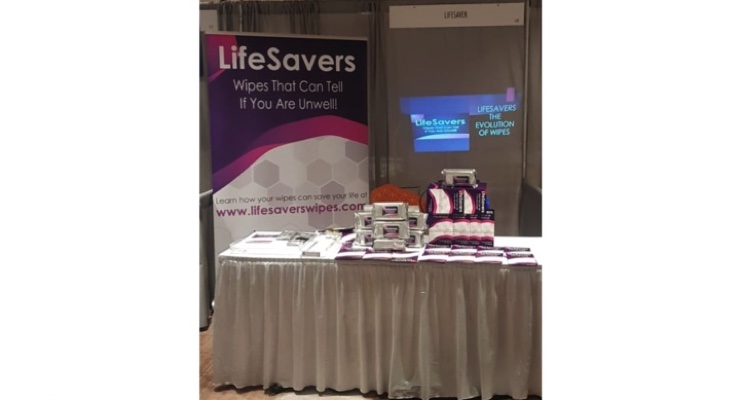Tara Olivo, associate editor08.13.21
Georgia Crawford loves people. The Jamaican-based educator and sociologist loves looking at people, understanding what they’re about and why they live the lives they live. Her deep discussions with members of her community led her to an idea that can help people not just in Jamaica, but all over the world.
Crawford is the creator of LifeSavers, a patented personal hygiene wipe that changes color if the user has abnormal health indicators in their urine. The current version of LifeSavers detects abnormal levels of glucose in urine. Abnormal glucose levels lead to potentially deadly health complications, especially for the over 400 million diabetics worldwide who must monitor their glucose levels daily, and pregnant women who are continuously at risk of gestational diabetes.

Georgia Crawford
Similar to the dip stick used in the doctor’s office, the wipe will change color if glucose levels are too high, therefore signaling to the user that immediate medical attention is needed. The wipes are therefore triple purposed; not only does it assist with personal hygiene after urinating, it also acts as an early warning system and an instant glucose monitor.
“In Jamaica we have quite a few people who have diabetes, and what I was finding is that these individuals, once they get sick, they don’t always manage their condition,” Crawford explains. “When they don’t manage their condition, there are a lot of people who die, a lot of people who develop worse conditions as a consequence—they have strokes, heart disease and kidney failures, but it’s preventable—it’s about managing.”
This realization came to life for Crawford when a seemingly healthy neighbor of hers from where she grew up went blind. When she asked what happened, the neighbor said it was her diabetic condition, which was not monitored.
“The problem with monitoring diabetic conditions right now is that it takes a change in behavior and people don’t like to change their behavior,” Crawford says. “We are creatures of habit. As women in particular, when we urinate, we automatically wipe, we use toilet paper or a wipe, so there’s no change in behavior.”
With LifeSavers, the wipe can be functional without a change in behavior. By wiping, the user can get additional information about their health so that they can take preventative measures that could ultimately save their life.
“It was that sort of thinking and understanding of people, how people behave and my background as a sociologist that led me to come up with this idea,” she says. “The aim for us was to make every day activities more beneficial to people, even if they don’t think there’s a problem. If you’re going to use toilet paper or a wipe anyway, why not use one that can tell you something is wrong? Why not get some information?”
The product, she says, isn’t just a monitor, it’s also an early warning device. It says to the person what they might not be thinking about. If they wake up in the morning and use the wipe after urinating, it could show them there could be a problem, they could seek assistance and learn to change their behaviors.
Crawford and her team began working on the product about 18 months ago, right before the pandemic took hold of the world, and they’re currently at the stage of development where they’re seeking approvals in FDA-approved labs.
Although the team is currently manufacturing wipes on a small scale to send out to labs, their aim is to partner with wipes manufacturers that can use LifeSavers’ solutions to make their products better. “We don’t want to go and reinvent the wheel, we don’t intend to compete with companies that already make wipes. We’re saying to them, ‘Work with us to make your wipe more functional,’” she says.
The company’s coming out was at last month’s World of Wipes International Conference in Atlanta. “We’ve got quite a bit of interest, and we’re happy about that,” Crawford exclaims. “We’re very excited about what is next. We believe a wipe as a health indicator can be successful.”
While the launch product is starting with the detection of abnormal glucose levels, the company is moving next to develop detection solutions for other health complications or conditions including urinary tract infections, kidney disease, heart failure and pregnancy. They also believe what they’re doing with wipes can be done with diapers. For instance, if an elderly person is using a diaper and it changes color, the person or caregiver can notice something is wrong and can start administering help before it’s too late.
“We are excited about the possibilities and how we can use our solution in other ways to make life better for people in general,” Crawford concludes.
Crawford is the creator of LifeSavers, a patented personal hygiene wipe that changes color if the user has abnormal health indicators in their urine. The current version of LifeSavers detects abnormal levels of glucose in urine. Abnormal glucose levels lead to potentially deadly health complications, especially for the over 400 million diabetics worldwide who must monitor their glucose levels daily, and pregnant women who are continuously at risk of gestational diabetes.

Georgia Crawford
“In Jamaica we have quite a few people who have diabetes, and what I was finding is that these individuals, once they get sick, they don’t always manage their condition,” Crawford explains. “When they don’t manage their condition, there are a lot of people who die, a lot of people who develop worse conditions as a consequence—they have strokes, heart disease and kidney failures, but it’s preventable—it’s about managing.”
This realization came to life for Crawford when a seemingly healthy neighbor of hers from where she grew up went blind. When she asked what happened, the neighbor said it was her diabetic condition, which was not monitored.
“The problem with monitoring diabetic conditions right now is that it takes a change in behavior and people don’t like to change their behavior,” Crawford says. “We are creatures of habit. As women in particular, when we urinate, we automatically wipe, we use toilet paper or a wipe, so there’s no change in behavior.”
With LifeSavers, the wipe can be functional without a change in behavior. By wiping, the user can get additional information about their health so that they can take preventative measures that could ultimately save their life.
“It was that sort of thinking and understanding of people, how people behave and my background as a sociologist that led me to come up with this idea,” she says. “The aim for us was to make every day activities more beneficial to people, even if they don’t think there’s a problem. If you’re going to use toilet paper or a wipe anyway, why not use one that can tell you something is wrong? Why not get some information?”
The product, she says, isn’t just a monitor, it’s also an early warning device. It says to the person what they might not be thinking about. If they wake up in the morning and use the wipe after urinating, it could show them there could be a problem, they could seek assistance and learn to change their behaviors.
Crawford and her team began working on the product about 18 months ago, right before the pandemic took hold of the world, and they’re currently at the stage of development where they’re seeking approvals in FDA-approved labs.
Although the team is currently manufacturing wipes on a small scale to send out to labs, their aim is to partner with wipes manufacturers that can use LifeSavers’ solutions to make their products better. “We don’t want to go and reinvent the wheel, we don’t intend to compete with companies that already make wipes. We’re saying to them, ‘Work with us to make your wipe more functional,’” she says.
The company’s coming out was at last month’s World of Wipes International Conference in Atlanta. “We’ve got quite a bit of interest, and we’re happy about that,” Crawford exclaims. “We’re very excited about what is next. We believe a wipe as a health indicator can be successful.”
While the launch product is starting with the detection of abnormal glucose levels, the company is moving next to develop detection solutions for other health complications or conditions including urinary tract infections, kidney disease, heart failure and pregnancy. They also believe what they’re doing with wipes can be done with diapers. For instance, if an elderly person is using a diaper and it changes color, the person or caregiver can notice something is wrong and can start administering help before it’s too late.
“We are excited about the possibilities and how we can use our solution in other ways to make life better for people in general,” Crawford concludes.



















